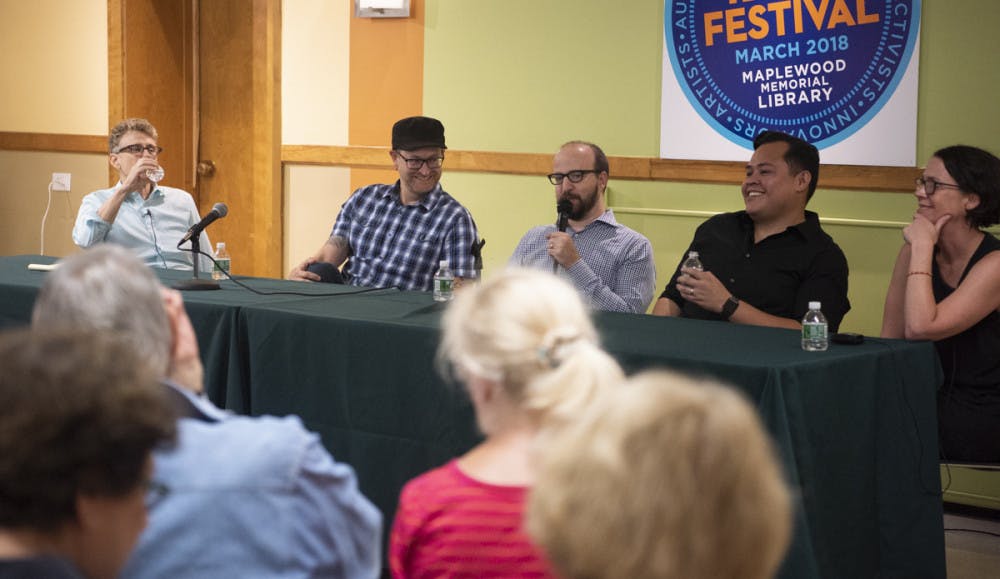On Sept. 13, the Maplewood Memorial Public Library hosted an event called “How Podcasting is Changing Radio,” which featured four panelists considered experts in the field, Julie Snyder, Lee Hernandez, Erik Diehn, and Tony Phillips.
[caption id="attachment_24069" align="aligncenter" width="838"] Photo via shu.edu[/caption]
Each with their own respective experience in podcasting, the panelists consistently mentioned how podcasting has emerged as a large outlet for consumers in the media industry.
A big topic discussed during the conference was why podcasting is becoming much more popular than radio. Diehn emphasized the fact that consumers can listen to podcasts whenever they wish, instead of having to tune in at a specific time for the radio.
Hernandez mentioned the wide variety of topics and opinions involved with podcasting, stating that podcasting gives both the creators and audience more freedom.
The event also included information about the beginning of podcasts. Podcasting has only recently become a popular commodity for consumers.
Back in the day, radio was much easier to access, but with the emergence of portable digital audio playback devices in 2004, the popularity of podcasts has slowly been increasing since. The fact that podcasts are free is also a big reason for its popular demand.
Radio has good content, but the fact that there is a specific time for consumers to tune in is something that has greatly derailed the radio industry. It is also much harder to find a specific topic discussed during radio shows, consumers often listen to shows without really knowing what is going to be discussed.
People at Seton Hall University have also shared their opinion on this topic. WSOU’s staff representative Jose Feliciano is a big believer in the emergence of podcasts. “The need for discussion on certain topics have been more in demand and platforms are paying attention, and that’s why podcasts are becoming so big,” Feliciano said. Feliciano mentioned that the fact that anyone can do it helps its cause, “That only increases the amount of content that’s out there,” he said. He believes that the popularity of podcasts will continue to grow.
Matthew Pressman, Assistant Professor of Journalism believes podcasting has an advantage because of its accessibility.
“It’s very convenient to be able to listen to your favorite programs whenever you want, whether you are on the subway or wherever,” he said.
Just as podcasts are affecting radio, the same could be said about the internet affecting print journalism. The internet has become much easier to access in comparison to news outlets like printed newspapers or magazines.
Along with this, the internet contains endless content, a person can look up information about anything by just going onto their phone. Newspapers and magazines are also digitized nowadays which makes print journalism less of a necessity.
The rise of these media outlets have put other outlets in danger because they are no longer a necessity. The consumption of media is changing, and the media industry has to evolve with it.
Jose Ornelas can be reached at jose.balderramaornelas@student.shu.edu.
Photo via shu.edu[/caption]
Each with their own respective experience in podcasting, the panelists consistently mentioned how podcasting has emerged as a large outlet for consumers in the media industry.
A big topic discussed during the conference was why podcasting is becoming much more popular than radio. Diehn emphasized the fact that consumers can listen to podcasts whenever they wish, instead of having to tune in at a specific time for the radio.
Hernandez mentioned the wide variety of topics and opinions involved with podcasting, stating that podcasting gives both the creators and audience more freedom.
The event also included information about the beginning of podcasts. Podcasting has only recently become a popular commodity for consumers.
Back in the day, radio was much easier to access, but with the emergence of portable digital audio playback devices in 2004, the popularity of podcasts has slowly been increasing since. The fact that podcasts are free is also a big reason for its popular demand.
Radio has good content, but the fact that there is a specific time for consumers to tune in is something that has greatly derailed the radio industry. It is also much harder to find a specific topic discussed during radio shows, consumers often listen to shows without really knowing what is going to be discussed.
People at Seton Hall University have also shared their opinion on this topic. WSOU’s staff representative Jose Feliciano is a big believer in the emergence of podcasts. “The need for discussion on certain topics have been more in demand and platforms are paying attention, and that’s why podcasts are becoming so big,” Feliciano said. Feliciano mentioned that the fact that anyone can do it helps its cause, “That only increases the amount of content that’s out there,” he said. He believes that the popularity of podcasts will continue to grow.
Matthew Pressman, Assistant Professor of Journalism believes podcasting has an advantage because of its accessibility.
“It’s very convenient to be able to listen to your favorite programs whenever you want, whether you are on the subway or wherever,” he said.
Just as podcasts are affecting radio, the same could be said about the internet affecting print journalism. The internet has become much easier to access in comparison to news outlets like printed newspapers or magazines.
Along with this, the internet contains endless content, a person can look up information about anything by just going onto their phone. Newspapers and magazines are also digitized nowadays which makes print journalism less of a necessity.
The rise of these media outlets have put other outlets in danger because they are no longer a necessity. The consumption of media is changing, and the media industry has to evolve with it.
Jose Ornelas can be reached at jose.balderramaornelas@student.shu.edu.





